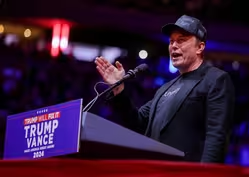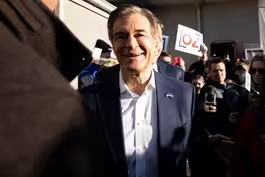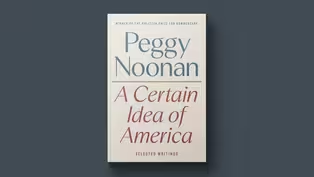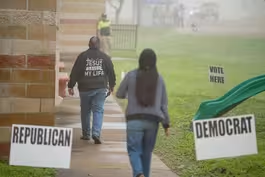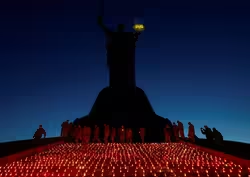
After hurricane, Grenada demands action on climate change
Clip: 11/19/2024 | 7m 55sVideo has Closed Captions
CLIMATE DISASTER
Delegates at the U.N. climate summit are frantically trying to strike a deal that would provide as much as $1 trillion per year for developing countries to help them withstand the impact of climate change. No country is watching the talks more closely than Grenada. Hurricane Beryl, energized by warmer waters, caused catastrophic damage there in July. Special correspondent Laura Trevelyan reports.
Problems playing video? | Closed Captioning Feedback
Problems playing video? | Closed Captioning Feedback
Major corporate funding for the PBS News Hour is provided by BDO, BNSF, Consumer Cellular, American Cruise Lines, and Raymond James. Funding for the PBS NewsHour Weekend is provided by...

After hurricane, Grenada demands action on climate change
Clip: 11/19/2024 | 7m 55sVideo has Closed Captions
Delegates at the U.N. climate summit are frantically trying to strike a deal that would provide as much as $1 trillion per year for developing countries to help them withstand the impact of climate change. No country is watching the talks more closely than Grenada. Hurricane Beryl, energized by warmer waters, caused catastrophic damage there in July. Special correspondent Laura Trevelyan reports.
Problems playing video? | Closed Captioning Feedback
How to Watch PBS News Hour
PBS News Hour is available to stream on pbs.org and the free PBS App, available on iPhone, Apple TV, Android TV, Android smartphones, Amazon Fire TV, Amazon Fire Tablet, Roku, Samsung Smart TV, and Vizio.
Providing Support for PBS.org
Learn Moreabout PBS online sponsorshipAMNA NAWAZ: Delegates at the United Nations climate summit in Azerbaijan are frantically trying to strike a deal that would provide as much as $1 trillion per year for developing countries to help them withstand the impact of climate change.
No country is watching the talks more closely than Grenada in the Eastern Caribbean.
In July, Hurricane Beryl, energized by warmer waters, caused catastrophic damage to Grenada's islands of Carriacou and Petite Martinique.
Special correspondent Laura Trevelyan now from Carriacou on the recovery effort and the preparations for whatever the future holds.
LAURA TREVELYAN: This is the trail of destruction Hurricane Beryl left across Carriacou.
The Category 4 storm made landfall on July the 1st with winds of more than 150 miles per hour, damaging 98 percent of the island's homes.
The storm caught many in Carriacou unawares as it strengthened so rapidly.
This is what's left of the historic Roman Catholic church.
The parish priest is Father Andrew Barnard.
FATHER ANDREW BARNARD, Catholic Church: It's heartbreaking, really, to see the destruction, total destruction.
LAURA TREVELYAN: Father Andrew took refuge in the sacristy of the church as the storm raged.
FATHER ANDREW BARNARD: After the storm calmed down, I came out and went into the community to encourage persons who were on the streets, devastated, shocked, bewildered.
LAURA TREVELYAN: It's interesting to see that Christ and Mary and Joseph survived the storm.
FATHER ANDREW BARNARD: Yes.
All these had remained intact, and I immediately signed myself.
LAURA TREVELYAN: Do you think it's a symbol?
Oh, I'm so sorry, Father.
Is it symbolic?
FATHER ANDREW BARNARD: It's very symbolic.
It is symbolic because it tells us that he's watching over us.
LAURA TREVELYAN: The hurricane killed three people here on the day it struck.
That death toll rose in the storm's aftermath.
Carriacou's minister Tevin Andrews told me why.
TEVIN ANDREWS, Minister, Carriacou and Petite Martinique Affairs and Local Government: Roads were blocked because of the telephone poles in the road and the trees and debris and other things like that.
They couldn't get to the hospital.
I lost close friends.
I lost close, close friends as a result of this.
LAURA TREVELYAN: People on this close-knit island with a population of less than 10,000 are mourning those they lost while trying to recover.
It's the rainy season, making life arduous for Patricia McNeil, who lives upstairs and owns a pharmacy on the ground floor.
PATRICIA MCNEIL, Pharmacy Owner: Whenever the rain falls, this area where we stand in is -- the water is like this high.
So it slips through the ceiling.
So I have to put down buckets and move the shelves around so that the goods don't get wet.
It's been like that ever since, sweep, mop, put down buckets, as long as the rain comes.
LAURA TREVELYAN: Would you consider leaving Carriacou?
PATRICIA MCNEIL: No.
To go where?
(LAUGHTER) PATRICIA MCNEIL: That's my home.
I don't have anywhere to go.
LAURA TREVELYAN: Samantha feels just the same way.
Even though this mother of eight now struggles to find diapers and wipes for her baby Zadel (ph), Carriacou is home.
What happened to your house?
SAMANTHA STEWART, Mother: Everything gone.
LAURA TREVELYAN: Everything?
SAMANTHA STEWART: Everything gone, gone, gone.
LAURA TREVELYAN: The roof?
SAMANTHA STEWART: Everything.
This was my office.
This is something I build back.
LAURA TREVELYAN: What is life like now?
SAMANTHA STEWART: Well, life is -- well, life is now very tough for me.
LAURA TREVELYAN: Water is in short supply for Samantha and so many others.
People used to catch rainwater on their roofs and store it.
You can't do that if your roof is blown off.
And for the fishermen who make their living from the water, the hurricane was catastrophic.
Fishing isn't just part of the historical tradition of Carriacou.
Fishermen are a key part of this community.
So when Hurricane Beryl blew through and destroyed the fishermen's boats, it struck at the very heart of this island.
In the village of Windward, I meet Alwyn Bethell, who's been fishing these waters for more than 50 years.
Can you just tell me about the damage that Hurricane Beryl did to the fishermen's boats?
ALWYN BETHELL, Fisherman: Plenty damage, plenty, a lot of damage.
LAURA TREVELYAN: Like what kind of thing?
Boats smashed up?
ALWYN BETHELL: Like, boats smashed up.
They lost their boats.
They lost their lines.
They lost everything.
They lost their livelihoods.
So, they got to go back and start all over again.
LAURA TREVELYAN: That's got to be so hard.
ALWYN BETHELL: Yes, really hard.
LAURA TREVELYAN: Hurricane Beryl destroyed industries old and new.
Just look at Carriacou's solar panels, which were a source of great pride for Grenada's government.
We saw your solar panels here, and we saw that they had been destroyed.
TEVIN ANDREWS: Yes.
Millions of dollars were spent in getting this solar panel going, because we wanted to be the first island, small island, in the Caribbean to be 100 percent reliant on renewable energy.
That was our aim, our goal, and still is our aim, our goal and our mission.
We are playing our part.
We are doing what we're supposed to do.
We want the bigger countries to also play their part and do what they're supposed to do.
LAURA TREVELYAN: A sentiment echoed by students at the newly reopened Hillsborough Secondary School.
These high schoolers want the industrialized countries to reduce their polluting emissions.
KHALIL LENDORE, Student: It is not fair that they are doing the polluting and we are facing the consequences.
So there needs to be a stop to this immediately.
NISHANTI ALLERT, Student: As a small developing nation, we are suffering.
We are not equipped with the resources to combat these forces of pollution.
KIARA BAPTISTE, Student: I would say I myself am still suffering from trauma, because any time the rain falls against the table, it's like bullets, and you always have to wonder, OK, is this Beryl coming back again?
So you live with some sense of trauma, I would say.
LAURA TREVELYAN: So much needs to be repaired.
Grenada's government had hurricane insurance.
That's paying for some of the massive rebuilding effort.
And the country's debt repayments are on hold thanks to a special hurricane clause.
But this tiny economy can't withstand many more storms.
TEVIN ANDREWS: This little piece of heaven, this united community spirit, people, our existence are threatened because of the actions and inactions of our world leaders.
LAURA TREVELYAN: What's the single most important thing that would help you that the developed world could do?
TEVIN ANDREWS: Put their money where their mouth is, less talk, more action.
Stop talking, more action.
Put the money where it's supposed to go.
And keep to your commitments, stick to your commitments.
LAURA TREVELYAN: Carriacou isn't counting on outside help, though.
The islanders are trying to build back better, so future generations can survive whatever lies ahead.
For the "PBS News Hour," I'm Laura Trevelyan in Carriacou.
Federal workers brace for Trump's civil service plans
Video has Closed Captions
Clip: 11/19/2024 | 10m 9s | Federal workers brace for Trump's plan to potentially replace them with loyalists (10m 9s)
A look at Dr. Oz's health care record
Video has Closed Captions
Clip: 11/19/2024 | 5m 59s | A look at Dr. Oz's health care record as he's nominated to key post by Trump (5m 59s)
Peggy Noonan explores what U.S. could be in new book
Video has Closed Captions
Clip: 11/19/2024 | 8m 24s | Peggy Noonan explores what the U.S. could be in 'A Certain Idea of America' (8m 24s)
Texas border county breaks from Democrats and votes GOP
Video has Closed Captions
Clip: 11/19/2024 | 7m 32s | What led a Texas border county to break from Democrats and vote Republican (7m 32s)
Ukraine uses American-made missile system inside Russia
Video has Closed Captions
Clip: 11/19/2024 | 5m 16s | On 1,000th day of war, Ukraine hits targets inside Russia with U.S.-made missile system (5m 16s)
Providing Support for PBS.org
Learn Moreabout PBS online sponsorshipSupport for PBS provided by:
Major corporate funding for the PBS News Hour is provided by BDO, BNSF, Consumer Cellular, American Cruise Lines, and Raymond James. Funding for the PBS NewsHour Weekend is provided by...
